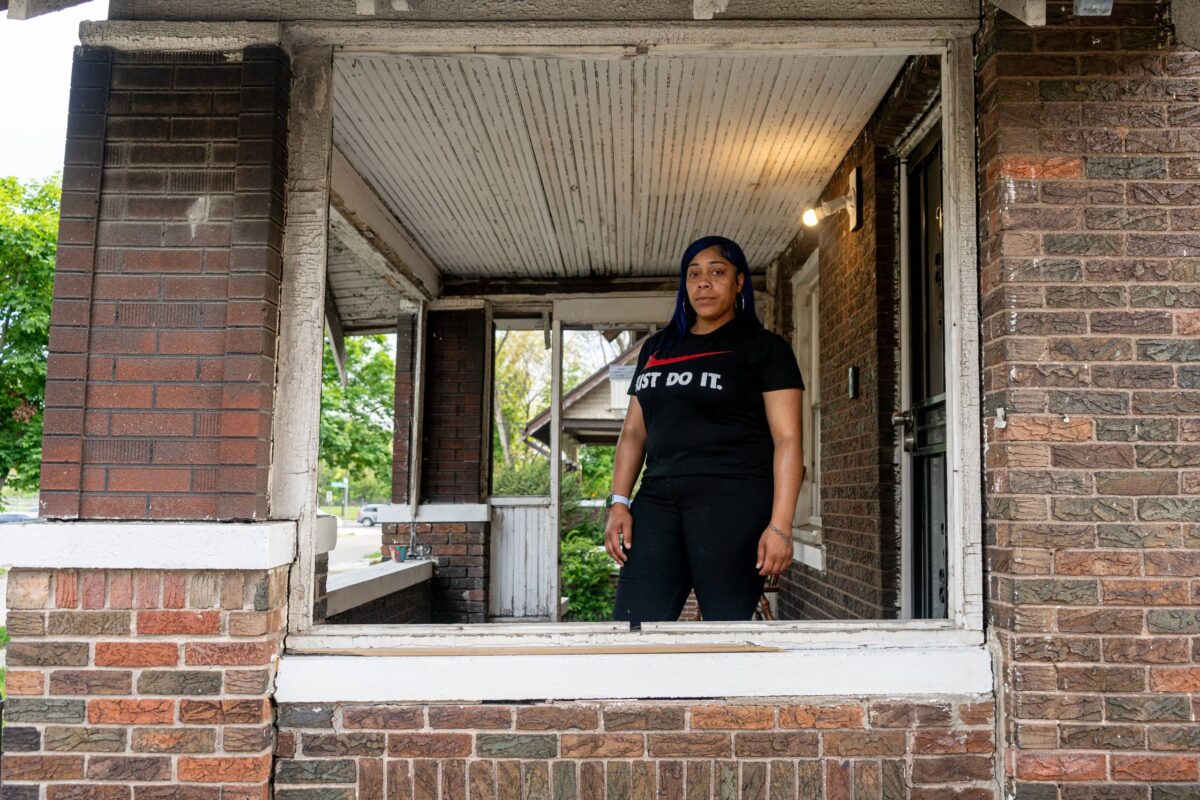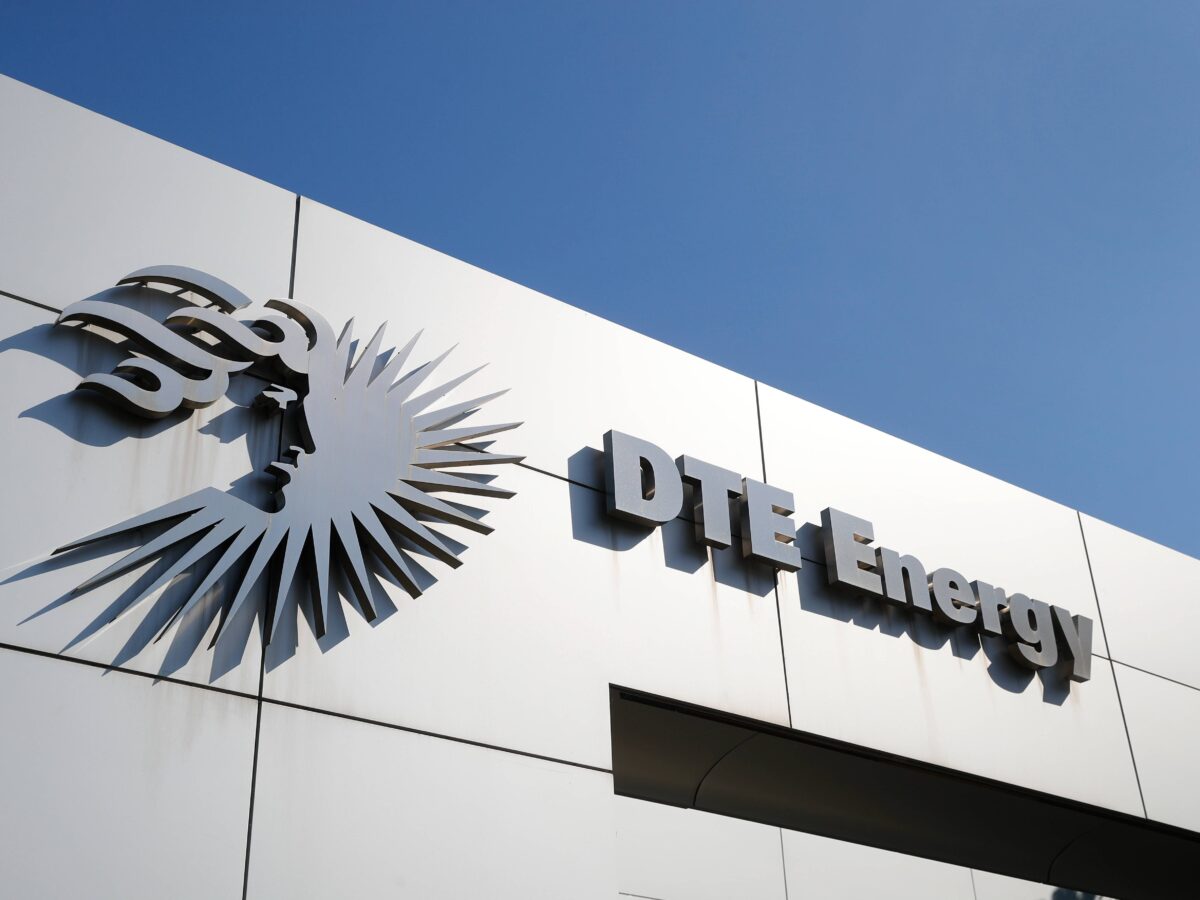Overview:
-"I've been trying to get help for months, but everywhere I turn they say they are out of funds," said Detroiter Tanisha Humphrey, who's experienced two recent DTE shutoffs.
-Humphrey's gas and electric bill totals $500 to $600 per month for her three-bedroom bungalow.
-DTE asked state regulators last month to approve a rate hike of $574 million.
by Sarah Alvarez, Outlier Media
“You can’t have anything for free. I get it,” Tanisha Humphrey said. She does “get it,” more than most. The Detroit resident works in billing for an essential public service. Reminding or cajoling people to pay is a big part of her day-to-day. She asked her employer not be named because she wasn’t sure she had permission to speak to the media.
Humphrey can afford to pay most of her bills, but gas and electric service are another story. Those utilities cost her between $500 and $600 every month. She lives in a three-bedroom bungalow on Detroit’s westside she bought from the Detroit Land Bank Authority. A household that pays more than 10% of its income toward utilities is considered “energy burdened.” It’s a group many Detroiters belong to.
“With everything going up, people are going to have a hardship,” she said last week. “And now I’m having a hardship.”
Humphrey’s gas and electric service was disconnected on Thursday, May 8 for nonpayment. She spent Mother’s Day alone, having sent her 6-year-old son to stay with his father until she could get the power turned back on.
“That was tough, but I’d rather have him there, experiencing something normal for him, rather than try to explain this situation to him,” she said. This is the second time in about six months Humphrey has been disconnected. She is far from alone.
Last year, DTE Energy — Michigan’s largest utility — reported to regulators that it disconnected 211,647 customers for nonpayment. This is up from 2023, when 202,976 customers were shut off after falling behind on their bills. The company is not required to report which ZIP codes or communities are most affected.
A DTE spokesperson declined to comment on Humphrey’s situation. “We work hard to help our customers avoid an interruption of service,” the spokesperson said. “We never want anyone to fall behind or go without power.”
Humphrey owed the company more than $4,000 that built up over the last several months. DTE does have payment plans, but Humphrey said the company told her she would need to pay half her bill to begin. She just doesn’t have it.
“I’ve been trying to get help for months, but everywhere I turn they say they are out of funds,” she said.
Humphrey reached out to six agencies for help, including St. Vincent de Paul Detroit and The Heat and Warmth Fund. All were out of the money they typically use for utility assistance.
DTE sends shut-off numbers to regulators quarterly. In the last quarter of 2024, it reported 47,817 customers were shut off for nonpayment and 37,767 had their power restored that same quarter — but only 874 of those people were restored “due to receiving assistance.”
Humphrey did receive emergency relief from the state and the Wayne Metropolitan Community Action Agency — also known as Wayne Metro — when she was shut off in October. She was grateful to be able to get reconnected with their help and pay off some of her DTE debt.
“I was so grateful for the help,” she said. But without a payment plan, she was back in trouble within a few months.
Jasmine Carson, an executive director at Wayne Metro, confirmed that the Michigan Energy Assistance Program (MEAP) — which agencies like hers have used to help people avoid or end shut-offs — is out of funds until the new fiscal year, which begins in October.
Humphrey doesn’t feel that the gas or electricity she uses is excessive, nor does she know how to better keep the costs under control. When this crisis is over, she plans to ask DTE for a home energy assessment.
“I’ve been trying to figure out how it’s that high,” she said. “I have no idea why it’s so expensive.”
The amount of Humphrey’s bill might seem high, but it is not uncommon in Detroit, especially when the weather becomes extremely hot or cold.
MORE REPORTING ON DTE ENERGY
Could Trump make it easier for DTE to build natural gas plants?
DTE CEO said efforts to roll back clean energy rules could facilitate natural gas buildout, provide “flexibility” on coal plant retirements. Experts warn building new gas plants could put ratepayers on the hook for stranded assets.
DTE Energy, Consumers Energy shareholder returns drive up Michigan energy bills: ‘It’s costing consumers so much money’
A national study reveals investor-owned utilities are charging U.S. ratepayers up to $50 billion annually for shareholder profits.
DTE files for $574 million rate hike, its second-largest request, months after its last increase
DTE Energy’s $574.1 million rate hike proposal aims to boost infrastructure and clean energy, raising Michigan residents’ bills by $13.50 monthly. Critics, including Michigan Attorney General Dana Nessel, challenge the plan, demanding proof that DTE’s expenses and rates are fair and justified.
Prices are up, assistance is down
DTE’s prices are among the highest in the Midwest and the country. But the company asked state regulators last month to approve a rate hike of $574 million, after a $217 million rate increase granted in January.
Asked to address the strain higher energy costs put on residents who already struggle to afford service, a spokesperson said the company has invested $1.5 billion in the electric grid, which has translated to fewer outages.
“Our upcoming rate case filing will build upon this success as we continue our work to improve electric reliability while maintaining the affordability that our customers demand and deserve by ensuring bills remain as low as possible,” the spokesperson said.
DTE is a private company, but its prices are set by the Michigan Public Service Commission. DTE’s rates go toward the cost of services, maintenance, upgrades and shareholder returns.
The cost of these bills is simply unaffordable for customers like Humphrey. Help used to come from the federal government’s Low-Income Heating and Energy Assistance Program (LIHEAP), but Donald Trump’s administration laid off everyone who worked to distribute that money to the states. A current budget proposal from the White House proposes eliminating the program.
“We are still monitoring closely the impact that the cuts on LIHEAP funds will have on Detroiters,” said Wayne Metro’s Carson. “What we do know is that MEAP funding is expected to double over the course of five years to continue to support those residents in need of assistance.”
For most customers who can’t afford their utility bills, a shut-off is imminent. A 2022 investigation by Outlier Media and ProPublica found DTE shut off more customers than the state’s second-largest utility, Consumers Energy, and that DTE’s shut-offs were not explained by the company’s size or the level of poverty within its service area. Another investigation found DTE engaged in aggressive debt collection practices.
With the federal safety net weakening, state legislators could require the Michigan Public Service Commission to take affordability into account when setting rates, as lawmakers in states from Ohio to Colorado have done.
Without action, more people will end up where Humphrey did.
“My friend has a generator and offered to let me borrow it for a few days,” she said. “I used it for the last four days. I still have to get ready for work.”
After Outlier Media started reporting on Humphrey’s shut off, Wayne Metro found additional assistance dollars that had been already been allocated but not disbursed to her last October. Her gas and electric service were restored Monday evening.
“I’m not really sure how it happened,” she said. “I’m just very grateful for all the help.”
Humphrey will now be able to enter into a payment plan with DTE. By putting an extra $200 a month into paying off her debt, she thinks she can finally get on top of the bill.
“I know it can be embarrassing to put your business out there in front of people, but sometimes you just have to let people know what’s going on in order to get help.”
Get involved
The Michigan Public Service Commission is meeting on May 29 in Detroit to hear from the public on how it can be more transparent and effective. The meeting will be from 6-8 p.m at Cadillac Place, 3022 W. Grand Blvd., Room L-150.
Detroit Documenters will cover the meeting. Read their past coverage of the commission.
This article first appeared on Outlier Media and is republished here under a Creative Commons Attribution-NonCommercial-NoDerivatives 4.0 International License.![]()




